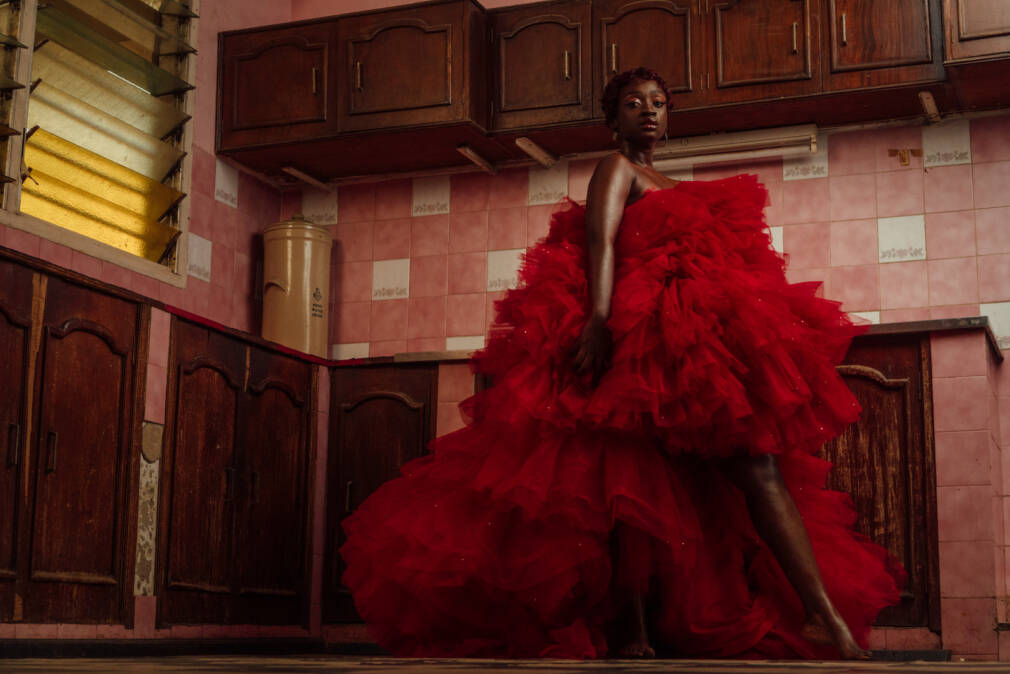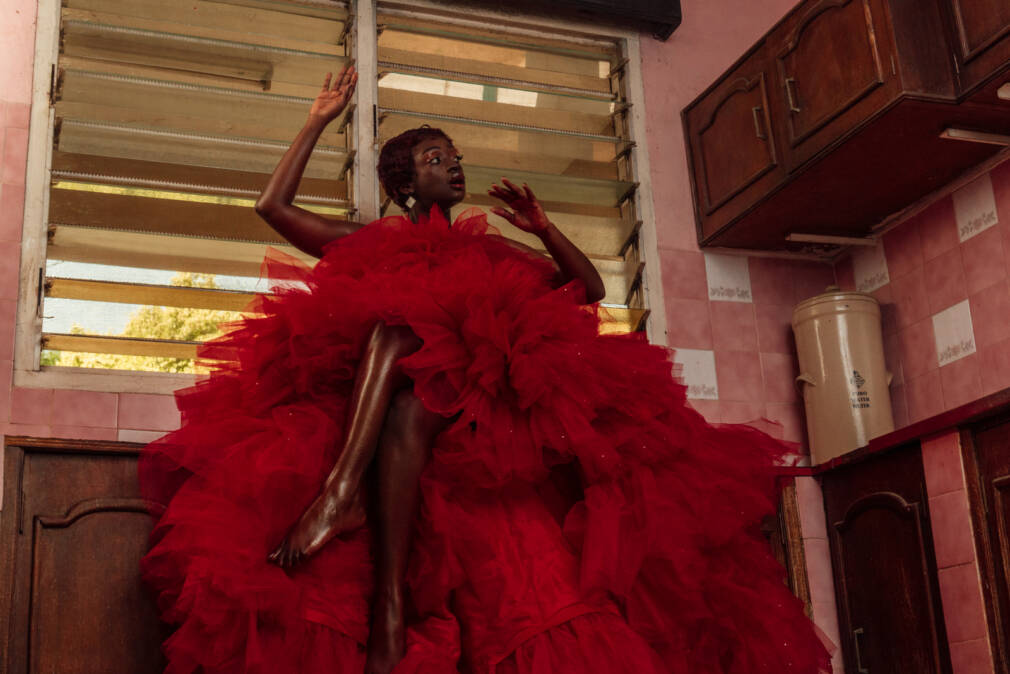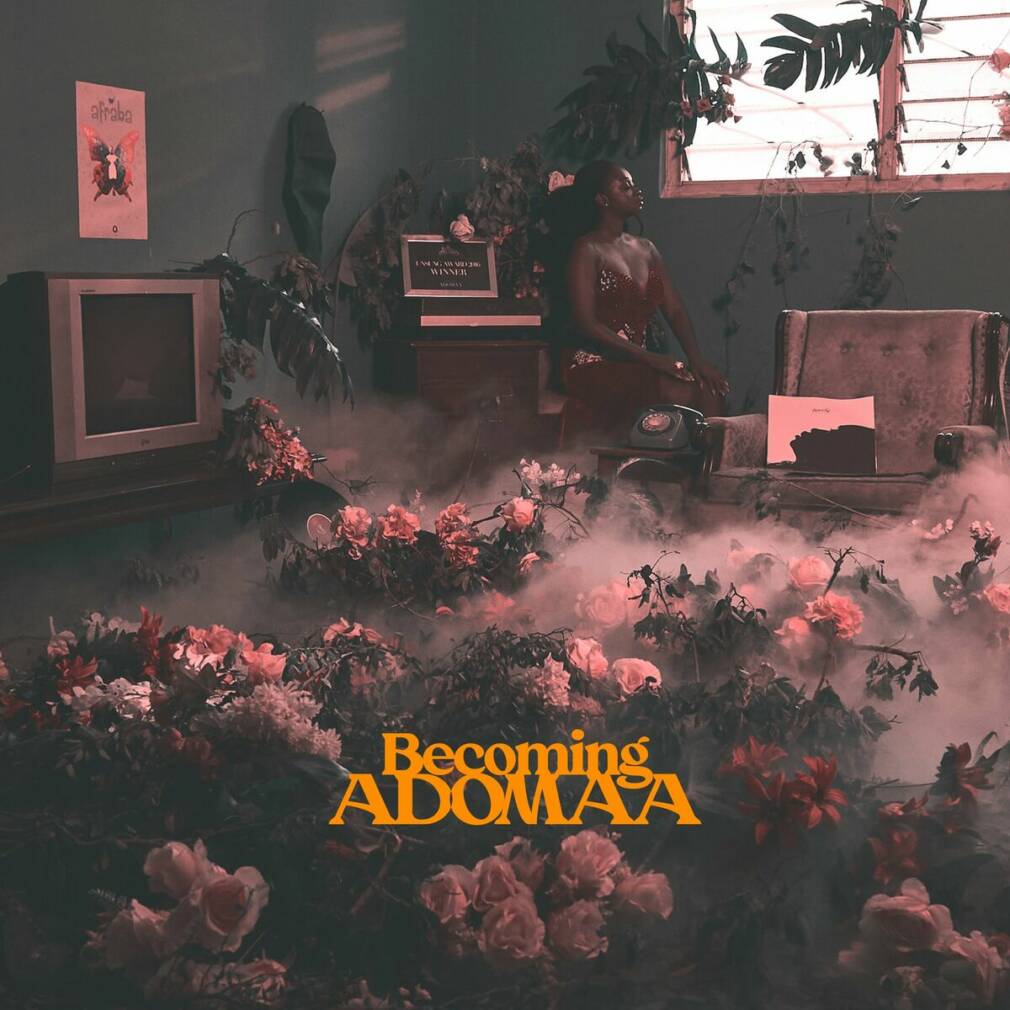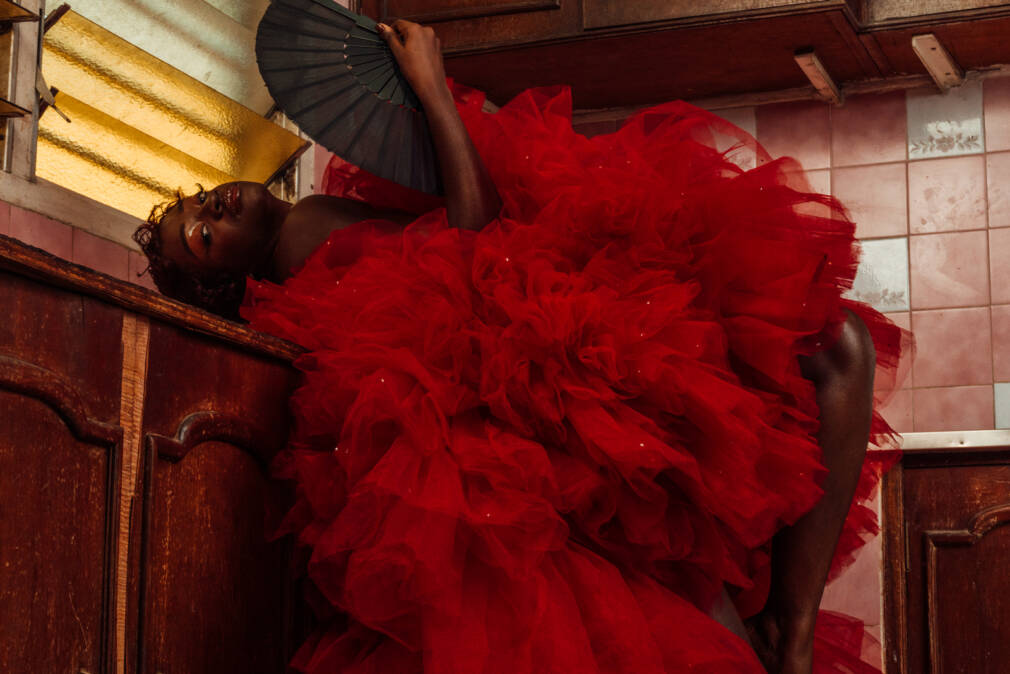Though raised in a house where everybody sings, Joy – Adomaa’s first name, couldn’t be forced into a solo in front of her family. Humming shyly in the privacy of her dad’s church hallways, she had to be harassed for months to join the choir. And when she finally recorded herself interpreting a mashup of Ghana’s biggest tunes, she tried hard to keep the video under the radar. She never asked for fame and attention. But her bright, alto voice and natural charisma couldn’t be kept in the shadows. Adomaa became viral, and with that came recognition, award nominations, and her first album Afraba. Soon after came disenchantment, doubt, bad contracts, depression, and ultimately, a crash.
Though it’s hard to empathize with artists’ complaints about the hardships of fame, cameras, public scrutiny, and pressure. Isn’t fame the ultimate goal? What more could one possibly need once you have it all? Isn’t that the dream? Adomaa would beg to differ. Nobody warned her of fame’s pitfalls, and the Ghanaian-Nigerian songstress learned her lesson the hard way. Her first ride through the industry circus almost killed her.
Years later, Adomaa is ready to start over. She fought the fight, did the healing work, and found solace in acting and a new approach to music. She’s beginning again, and after her 2020 project Barely Adomaa, she’s finally back and releasing the second part of the trilogy: Becoming Adomaa. She talked PAM through this uninhibited testimony on surviving the highs and lows of fame, out now via Hakuna Kulala.
Cloud nine and stormy weather
Adomaa was propelled to fame overnight out of unplanned circumstances. “Things had happened too fast, and I never got any opportunity to let it sink or properly accept it. I was just this shy, quiet, reserved girl, and all of a sudden I was this celebrity that people recognized as I walked in the streets. It was too much for me at once.” Working as a junior reporter at ViaSat1, her freshly posted medley of The Evolution of GH Music sparked her colleagues’ interest. Once they put the video on air, it quickly made rounds all over TV stations, radio, and social media. Her youthful rendition of E.T Mensah, Amakye Dede, Kojo Antwi, Kwabena Kwabena, and R2Bees hit the spot. And just like that, her soulful, airy vocals and bubbly attitude took the country by storm.
Things went swiftly: more medleys and covers, interviews, live performances, comparisons to Aṣa, and an EP. In early 2016, Adomaa released Afraba, a one-of-a-kind alternative treasure flowing from rock to gospel, pop, and folk, and a rarity at Ghanaian award ceremonies like the Vodafone Ghana Music Awards (where she won Unsung Artist of the Year). “I think people were more impressed by the fact that it was very different because in Ghana at the time, there was a lot of dancehall and Afropop music. But to get a project that seemed so alternative and different, people felt like it was a breath of fresh air”.

This idyllic time of change and discovery, between “cloud nine” and imposter syndrome, is recounted in the dreamy “In the Clouds’’, the second track on her 2022 album. “I was in two minds. A part of me was very grateful because people work so hard in this industry for years, and they don’t get recognition like that. But at the same time, I felt like a fraud. I felt like I didn’t know enough, hadn’t done enough. I felt like there was still so much to learn, and there were people who were more deserving of the recognition. And I also felt like I wasn’t ready.” Here lies the issue: Adomaa was thrown in at the deep end to sink.
Welcome to the (industry) circus
Pushed into the dog-eat-dog music industry, Adomaa promptly realized what was at play behind the spotlights and critical acclaim: her mental health. “I don’t think if you want to grow in a sane environment, the music industry is the place to do so. My advice to anybody trying to make it in music: you should probably have everything sorted out before you come in. You should probably have your talent sorted out, like your top-notch vocals, all your skills on lock.” Adomaa didn’t, and in the acoustic “Smoke and Mirrors”, the bitter reality sinks in. The young singer is now unable to recognize herself. Her music isn’t hers anymore, and neither are her creative choices, signed away in shady deals. So inevitably, she started to crumble. “I used to flop big time on stage. It started being more obvious to the world, and my mental health was in the gutter. So I was struggling, and it was starting to look much more visible. And that is when my career started to dip because I wasn’t that person. I couldn’t keep up with the facade I had started with.”
The lucky career turned into an inextricable trap described on “Circus”, an ominous, sad, and nagging track. “It has a double meaning. The circus can be this fun place where you can just go to have a good time, see the elephants, see the magic tricks, and basically have fun. But it also has a scary connotation, the way it’s depicted sometimes in horror movies, as this very scary place. It was like this music industry was supposed to be this fun place where I could express and be myself. But at the same time, it was so scary because of everything going on in my mind and how I hadn’t figured myself out. ”
Lights out
“I remember the very first time I had a panic attack. I had a meeting with one of the executives on that label, and it went really badly. I had to come out, and it was right there in the middle of the streets. I fell, and couldn’t breathe. And I thought I was going to die. […] It became a thing. Any time I wanted to make a song, or I had to go on stage to perform, or I tried to sing, I would have a panic attack.”
“I felt like I was going to die if I didn’t stop. It literally was life or death.” Neither the awards, the fans, nor the fame could save Adomaa from this deeply traumatic experience she now remembers as a fog. Anxiety and depression got the best of her, and she fell out of love with music. Lost, easily triggered, and vulnerable, she hit rock bottom. Hard. “During that period – which is what “Crash” basically captures, I was done. I had even, at some point, attempted suicide. It got that bad because I didn’t know what my purpose was. I just felt like a complete and utter mess.”
To save herself, Adomaa left music behind and longed for a new purpose, which manifested as acting. “It just felt like an answer to my prayers. I got cast for a role in another country, Nigeria, for a television series. So it required that I leave Ghana, which is the change of environment I needed. […] And life just made sense again. I wasn’t struggling. I wasn’t flailing about. It just felt like when you’re burning and someone pours water on you. That’s how it felt. That’s what that whole experience was. So acting saved me in a very, very big way.” Adomaa became Dede in the eponymous TV show, and Abena in the 2017 rom-com Badluck Joe. She found her “Utopia”, as she sings in the emotional ballad. But once healed of past traumas, she felt this strong pull to music again.
Salvation and new beginnings

In 2020, Adomaa rekindled her first love, with newfound knowledge and caution. She reintroduced herself to the audience with Barely Adomaa, a compilation of unreleased songs from a scrapped project. The singles “I am Tar” and “Be Your Own Beautiful” earned her prestigious nominations, including “Best Record of the Year” at the Vodafone Ghana Music Awards. But history won’t repeat itself. This time around, Adomaa is determined to do things on her terms.“I knew exactly what I was going into, so I could make that decision consciously, which leads to ‘Beginning Again’”, the last song on Becoming Adomaa. She chose not to be a puppet to labels and trends. She sought trustworthy partners, like the Ugandan label and collective Nyege Nyege “In 2016, they thought [Afraba] was really dope and they wanted to be a part of it and part of my career moving forward, but things didn’t really work out and I’m glad they didn’t. So we just felt like renewed energy […]. After going through the contracts, and having several conversations with them, it felt like a very good fit.” Now the 28-year-old is finally making the music she loves, complimenting it with visuals and her love for acting.
Adomaa’s Instagram bio reads “future EGOT” (for Emmy, Grammy, Oscar, and Tony awards). Her ambitions are clear, and with her love for theater, “it’s definitely happening”. She got a second chance at life and doesn’t plan on wasting it. “I feel like I’ve gone through the fire to get to this point. Regardless of how cliche that sounds, I see myself as a Phoenix now. So I feel like the butterfly has morphed into a phoenix and now my journey’s about to start. I know a lot of things, but there is still so much ahead of me that I’m not aware of […]. So yeah, the journey continues. ”
Becoming Adomaa out now via Hakuna Kulala (Nyege Nyege Tapes)





